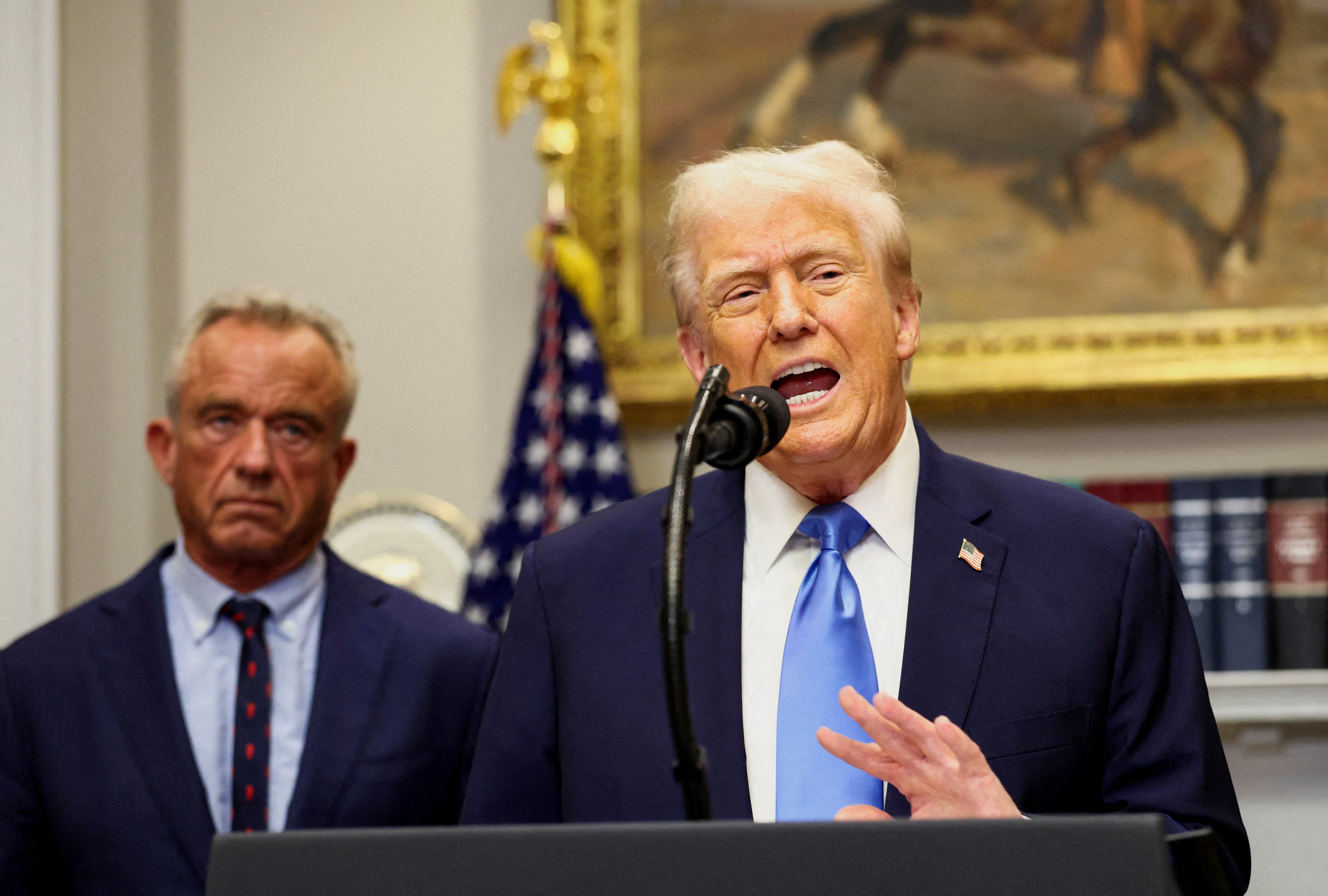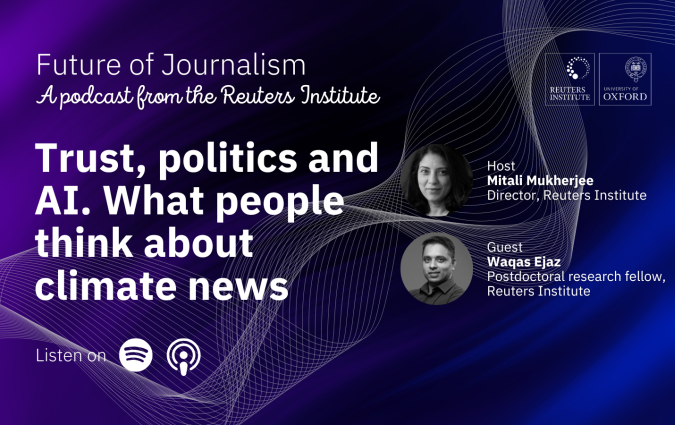How science journalists worldwide are fighting White House health misinformation

Donald Trump and Health Secretary Robert F. Kennedy Jr. during a recent event at the White House. REUTERS/Kevin Lamarque
Earlier this year, US President Donald Trump warned pregnant women to stop taking Tylenol – a brand name for paracetamol – or risk giving their children autism. This guidance has no scientific basis and was given during a press conference where Trump spoke along with Health Secretary Robert F. Kennedy Jr, who has repeatedly challenged scientific consensus in the past few years.
Trump and RFK Jr have often spoken against science. The US President has called climate change ‘the greatest con’. RFK Jr claimed some people have a harder time quitting antidepressants than heroin; he also pressed FDA to review abortion pill mifepristone safety and suggested risks are understated, despite long-standing data proving the drug is safe and effective.
Vaccines have been a common target, with Trump falsely correlating vaccines with autism and RFK Jr challenging the safety of both the COVID-19 vaccine and the DTP vaccine.
With so many attacks on health and science, what are specialised reporters and editors doing to counter this barrage of disinformation from the most powerful man on Earth? Do these messages have an impact around the world? And what are the challenges posed to the journalists covering these beats? To answer these questions and more, I spoke with five editors of science and health publications in the United States, South Africa, Kenya and Peru.
“Trump on steroids”
“We’ve never had a situation where science has become so polarised and so politicised,” said Ricke Berke, co-founder and executive editor of STAT, a US-based outlet that covers health, medicine and science.
Like many of the publications I spoke to, STAT has adjusted its editorial compass to meet this new political environment. Before this past year, Berke told me, they spent more time delving into longer investigative projects. Now, their focus is much more urgent and immediate, and they focus on whatever the Trump administration is saying or doing.
“We’ve tried to look at the science,” Berke said. “We see our mission as serving readers and being a watchdog, looking for the truth to see how this fits in with the scientific reality. We try to not weigh in by saying if this is bad or this is good. We just try to stick to the facts.”
Tom Zeller Jr is the Editor-in-Chief of Undark Magazine, a non-profit magazine covering the intersection of science and society. He said that the current political stance towards science has provided them with opportunities to look at new areas.
“It’s a little bit like Trump on steroids because we have RFK in place but I would like to think that we haven’t changed our editorial stance all that much,” Zeller said. “It’s been our North Star to follow the evidence wherever it leads and to try to do so in a non-ideological non-sensational way.”
The global spread of disinformation
The Trump administration’s challenge to scientific consensus has not only impacted his own country. False information around health and science has trickled down around the world as well.
Fabiola Torres is the editorial director and founder of Salud con lupa, the first investigative digital outlet specialising in public health in Latin America. She told me that issues surrounding health, at least in her native Peru, have become more polarised since the COVID-19 pandemic. However, if the pandemic was the first wave of an ‘infodemic’ as she calls it, we are currently experiencing a dangerous second wave.
“It’s a second wave because the rhetoric of leaders like Trump has undermined confidence in vaccines, as well as certain treatments and medications,” she explained. “For example, not long ago he was talking about how some medications could be linked to autism, feeding into a segment of the population who’s already quite influenced by this context. These are people who no longer believe anyone and have almost a conspiracy-minded mentality.”
Verah Okeyo, the CEO and publisher of the African health outlet DeFrontera, also identified politicians as the biggest sources of health disinformation. In Kenya, where she is based, many of the debates surrounding healthcare have religious undertones. She explained that some people believe that science is used against the will of God. In this context, Trump and RFK Jr are seen as saviours that legitimise these beliefs.
“I’m noticing that the hatred for science has merged with far-right ideology and religion, and it has given it a platform on which politicians can base whatever it is that they are saying,” she said.
In South Africa, our alumna Mia Malan, founder and editor-in-chief of the digital outlet Bhekisisa Centre for Health Journalism, said that these issues are not as polarised as perhaps in other contexts. But she stressed that some fringe groups, who are more likely to be conservative, religious and believe in other conspiracies, have become more vocal online. While online attacks have impacted her and her newsroom, she said that it also helped them to know where they have to direct their work.
“We would never respond to those attacks, but then we start doing reporting that explains why animal drugs can’t work for people, for example,” she explained. “It’s a very good indicator to know how to target our reporting and it works pretty well.”
From disinformation to health outcomes
The spread of health disinformation can have dire consequences. For example, the United States just recorded around 1,600 confirmed measles cases across 42 states, 25 years after being declared eliminated in the country. In South Africa, at least 60 confirmed cases of respiratory diphtheria were recorded between January 2024 and June this year. Peru is now experiencing an epidemic of whooping cough with more than a thousand confirmed records of the disease, an increase of 3,162% compared to last year.
Torres points out that whooping cough can be prevented through vaccination, but increased distrust in medicines and health authorities is a factor that has brought about deadly, but preventable epidemics.
“These anti-vaccine groups use what Trump says about vaccines to legitimise their views,” said Torres. “When political leaders contradict scientific consensus, they sow doubt in people's minds and create greater confusion.”
While vaccines are a tested and proven method for public health, misinformation often focuses intensely on one rare case of vaccine injury among 100,000 people, said Okeyo, who explained all this can be prevented by better science communication to help audiences understand how vaccines and medicines actually work.
“People are going to believe [misinformation] because scientists have not been explaining to journalists what it is that you do in those fortresses,” she said. “Scarcity of information is dangerous.”
When politicians spread vaccine disinformation, Berke said, they do so with a morsel of truth. There are indeed rare cases of vaccine injuries, for example, and journalists must not completely dismiss statements made by Trump or RFK Jr as completely untrue, but rather explain to audiences with nuance what the evidence is. Journalists must capture the complexity of science, especially as scientific progress is painstaking and often takes decades, with outcomes not always black-and-white.
“[Science] is hard and complicated,” Berke said. “Just like with your own personal health, you go to a doctor and you want quick answers. So what we try to do is understand and tell these stories in a way that captures the nuances. In covering this, it’s our obligation to level with readers about what we know and what we don't know about something.”
A crisis of trust
As we have documented in our own research, much of the public does not trust most news most of the time across the world, with only only 40% of people saying they do. While trust in science is nowhere near as low as trust in journalism, the past few years have documented a growth in the anti-vaccine movement and a rejection of medicine in favour of ‘natural’ alternatives.
Since the pandemic, many editors have reported a more polarised reaction when it comes to their reporting, with a growth in sceptics and even attacks from people in anti-science movements. Malan, for example, said her X account was hacked, her site’s website was attacked by bots, and she has personally been compared to a murderer after publishing pieces on vaccines.
“Our stories would be republished in the main publications, so naturally we were a very big target to the extent that we all had to go on an official online security course to learn how to protect ourselves,” she said.
Torres agreed: since the pandemic, anti-vaccine groups became more vocal in expressing their opinion on the reporting her outlet does. However, she said that the most challenging part has been to simply regain audiences’ trust in science and journalism. With people struggling in a complex information ecosystem, many may also turn to spaces where they can find information that fits their own beliefs.
“It's no longer just a matter of verifying, but a matter of regaining people's trust,” said Torres. “The pandemic brought news fatigue, so the problem is even bigger if people don’t want to listen to journalists and instead get carried away by narratives on the internet that are easier to consume and where they can believe what they want to believe.”
Berke acknowledged that most of the readers of his publication are people that are already more inclined to trust the scientific consensus. The challenge is to bring in people who distrust what you do.
“It’s a challenge, particularly with science and health institutions since they are coming under question like never before in modern history,” Berke said. “I don’t know what the answer is. All we can do is not get pulled into the political debates and try to be fair-minded, factual, credible and authoritative.”
Connecting with audiences
Ultimately, the editors I spoke to are convinced they need to focus less on debating political figures and more on meticulous, accessible, and community-focused reporting that aims to restore the public’s confidence in evidence.
Zeller said that the goal of science journalism shouldn’t be to be an adversarial force against Trump, but rather a conduit to present and explain science to audiences.
“If we are not talking across ideological lines and surfacing evidence in a way that’s accessible to everyone, then we are becoming part of the problem,” he said.
Malan agreed: “The media has a role to report accurately, but I learned that accurate reporting is completely useless if people can’t understand it. The most difficult thing to do is to translate science into something that ordinary people can understand.”
Torres said her publication aims to reduce the distance between "the paper, the policy, and the person" by creating short explainers on health policies and what they mean to citizens. Okeyo told me the key is to connect complex health stories to readers’ lives while prioritising data and facts.
“People are not able to connect what’s happening in healthcare, science and research to their wellbeing,” Okeyo said. “And when that gap is there, RFK and his crackpot theories get to fill in that space."
In every email we send you'll find original reporting, evidence-based insights, online seminars and readings curated from 100s of sources - all in 5 minutes.
- Twice a week
- More than 20,000 people receive it
- Unsubscribe any time
signup block
In every email we send you'll find original reporting, evidence-based insights, online seminars and readings curated from 100s of sources - all in 5 minutes.
- Twice a week
- More than 20,000 people receive it
- Unsubscribe any time






